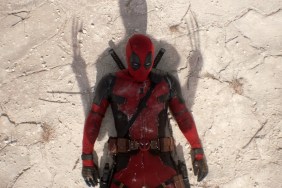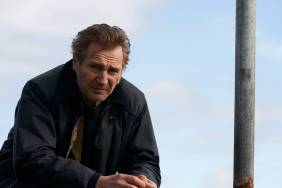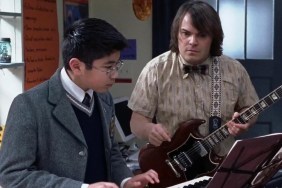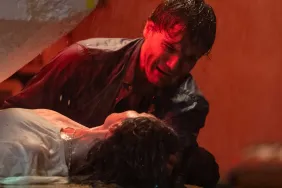
In the ‘90s, filmmaker Kevin Macdonald got his start making documentaries before winning an Oscar for his 2000 movie One Day in September. In recent years, he’s alternated between documentaries and narrative films, tackling different genres with a similarly clinical approach with which he made his docs.
After the acclaimed docudrama Touching the Void, Macdonald’s first narrative feature was 2006’s The Last King of Scotland, for which Forest Whitaker won an Oscar for playing Idi Amin. Macdonald followed that with the very different political thriller State of Play, the historic epic The Eagle and the sci-fi tinged-romance How I Live Now.
He’s now giving a go at a claustrophobic submarine thriller with Black Sea, starring Jude Law as an unemployed submarine captain put in charge of a ragtag team of British and Russian sailors that go searching for a Nazi submarine filled with gold bars that went down in the Russian waters during World War II.
It may be Macdonald’s best non-doc in quite some time, an edge-of-your-seat thrill ride that should appeal to anyone who loves submarine-set films without being the typical wartime action movie we’ve seen a number times before.
ComingSoon.net had a chance to sit down with Macdonald in December to talk about what went into making his latest narrative feature.
ComingSoon.net: This film has historic elements to it but also genre elements, because looking for Nazi gold has a certain Indiana Jones type feel to it.
Kevin Macdonald: Juicy genre elements…
CS: Yeah, so how did you find this? And was it based on anything that really happened?
Macdonald: Well, no, I came up with the idea myself, because I was just inspired by the Kursk disaster that happened in 2000. A Russian sub went down in the Barents Sea and some people survived for several days on the bottom of the ocean, but the rescuers couldn’t get to them and the oxygen ran out. It was just one of those terrible stories. But I thought that was an interesting premise for a movie. People stuck on the bottom of the ocean, and I began to think, “What are they doing there? Wouldn’t it be interesting to do a sub film that wasn’t military or Cold War, that was present day?” So when I was thinking about what they were doing, the must be on some kind of heist. Are they trying to steal something or get some treasure? It kind of built up in my head like that and I started thinking of “The Treasure of the Sierra Madre” and about greed and what greed does to people. Then I basically gave that to Dennis Kelly, the writer, who I met and talked about it and he was like, “This is something that interests me, but I like the idea of what I can say about these kind of characters, these characters that have been thrown on the scrap heap of life, basically. Skilled working class men who feel like their expertise, their skills, are no longer valued by society. So I guess that he put in this aspect that I really liked, which was the 1% vs. the 99% with the 99% fighting back, this kind of element which makes it feel quite current I think. That kind of resentment and anger that people can have against the system and against the people they feel are controlling the world in an unjust way.

That’s something that obviously happens in America, it happens in Britain, it happens in Russia, and actually, that was then what interested me about these Russian characters. Superficially, of course, there’s a tension between them, the Russians and the Brits, because these guys were old enough to be in the Cold War spying on each other, mistrusting each other. So there’s that mistrust there, but also they share in common that they’re all from the same social class, they’ve all been shat on by the system basically.
CS: They don’t get along at all and they don’t try to find the similarities between them. They just say “You’re British, I’m Russian, we’re just going to keep to ourselves.”
Macdonald: But they’re forced to have to work together later on.
CS: It has a quality a bit like “Ten Little Indians” but with the added tension being created by the two different factions.
Macdonald: I think what’s interesting to what Dennis did in the screenplay is that he takes historical elements and sort of imagines around them, twists them a little bit. He takes genre elements and twists them a little bit, so there are “Ten Little Indians” elements to it, but he doesn’t conform to that type completely. I think throughout you can see that, sort of taking elements of different genres and mixing them and matching them and playing with them, so it’s quite a self-aware, intelligent reworking of a traditional genre movie.
CS: What kind of research did each of you do? I don’t know if you’ve ever been in a submarine before…
Macdonald: I had once been on a submarine before when I was a kid, because I grew up in Scotland very near to the Naval base, which was the British Naval base, Faslane, and once had gone on a school trip there. The research, we did go to see a lot of subs that were in museums. There’s a submarine museum and there’s submarines all over the place that you can go and see. There was the wreck of a U-boat in Liverpool. There’s an actual U-boat, one of the two that’s still survived—there’s one in Chicago, weirdly, and there’s one somewhere in Northern Germany. But the key thing was finding this real Russian sub, which bizarrely, as Dennis started to write it, he started doing Russian submarines and he phoned me up and said, “You’d never guess. There’s a Russian sub of the correct vintage outside London, sitting in a river.” It’s like a Black Widow submarine, I think 1964-65 vintage, so we got in touch with the owner, who had bought it in the early ‘90s, thinking he’d turn it into a tourist attraction but it didn’t work. He was occasionally renting it out for a photo shoot or a party, but it was kind of like this rusting hulk sitting in the middle of the river, because no one would give him docking, because they were so worried that if they left it there it would sink because it’s so rusty. We went on board and it’s like an amazing museum piece. It’s a beautiful bit of Soviet design in great condition inside, terrible condition outside, and as soon as I saw it, I thought, “We have to film on here. There’s no way we can build something as incredible as this on a set.” So we did. I originally thought we would do the whole thing on there, but as soon as we started looking into the logistics of it, it was a nightmare.

CS: I can’t imagine how you would get cameras in there and be able to move them around.
Macdonald: So we ended up just filming two weeks, nine or ten days in there, to try and get the sense of the real place, and also it helped the actors, because they were in the real sub, down with the hatches closed, the smell of diesel in their nostrils, so they really sensed what it was like and then when we moved to the stage at the studio, then they brought that with them I think. As a director, I also brought some of the rigors of filming on the real sub, I had to bring those to the set because obviously on a real sub you can’t move the walls, you can’t move things out of the way, it’s hard to move the camera and the actors, because there’s nowhere for them to move, it’s basically just a corridor. I decided when I got onto the set that I would try to keep some of the same rigors, so I’d always have the camera inside the set. I didn’t build the set any bigger than the real submarine, so it was almost as awkward as filming on the (real sub). There was a playoff between being authentic and being claustrophobic and not wanting to be too visually repetitive, trying to balance those two things.
CS: I’ve been to the subway on the Intrepid and a couple others and you don’t realize when you’re walking through it for 20 minutes that people actually have to live in that confined space.
Macdonald: But also how many people. I mean, that submarine that we filmed on had 85 people and there’s only like 12 beds and you go, “F*ck! How do they survive on that?” It’s just misery and the stink of diesel now. Imagine what it was like when the engines were all running and everything.
CS: What about the underwater sequences, because there’s quite a few.
Macdonald: Yeah, they were really challenging. That was the most technically challenging stuff and directing people when they’re underwater is almost impossible. You’ve got this hydroponic microphone and you’re talking to them and it’s echoing around the pool and they can’t hear you when they’re breathing. All the lights keep fusing. It’s a nightmare as any director who has worked underwater will tell you. We had a particular nightmare because after the first week, we managed to turn all the water green and we had to empty all the water out, 1.2 million liters, and make a huge insurance claim and it was a disaster. We wanted the bottom of the tank to be soggy so when the guys stepped on it, they would sink in a little bit, so we put memory foam down on the bottom. It turned out that had bromine in it and bromine reacts with chlorine and replaces the chlorine and it turned the water green. And there was nothing we could do about it, so that was a bit of a disaster. But that was one of the main reasons to do the movie, from a cinematic point of view. I always knew that was going to be the heart of the film, it’s going to be the really big tense action sequence. And also a relief to get out of the submarine, and yet you think it’s going to be a relief and then it’s almost as claustrophobic in the darkness, in the murkiness. We combined elements of CG with bits of set, because you can only put small slivers of set into the tank and they would extend it off to the sides with CG and get rid of the sides of the tank if you saw them and that kind of thing. It was the kind of thing where if I ever had to do it again, I’d be really good at it. (laughs)

CS: What about casting the movie, because there are a lot of characters in Dennis’ script including a lot of Russian characters who may have been harder to cast. There are probably a lot of great Russian actors but none who are very well known.
Macdonald: Well, exactly, and I was very insistent, as I always am in making movies—I’m a bit pigheaded about this—I want to have some people who are authentic as possible. With all the actors, I saw it a bit as being a character ensemble. It’s a lot of great characters who all have to play their part, all have to be very specifically recognizable. There’s always 11 or 12 people and you have to know who they are and have a sense of what they’re like very quickly. I think the big chance for Jude is that he actually had to transform himself into a character actor essentially to play in this.
CS: I feel like Jude’s always been a character actor but one who was able to take on more leading roles.
Macdonald: I think that’s very perceptive… because that’s what I think. (laughs) I think that actually when he’s always been at his best as an actor is when he’s playing characters that are distant from himself, whether that be Karenina in “Anna Karenina” or Dom Hemingway or whether it be “Road to Perdition”—his part as the killer, he’s great in that and out there. But I think what’s the different about this is he’s the lead, but he’s a character actor. It was important to me that I got real Russians. Against the studio’s wish, I went to Russia and met a lot of people. These guys that are in it, a lot of them are very well known Russian actors. A couple of them are really big stars actually. There’s the guy called Blackie, he’s one of the two or three biggest actors in Russia. The young guy Gregori, he’s a very well known actor—he’s kind of a young star in a matinee idol kind of way. He’s in The Most Wanted Man—he is the most wanted man. In fact, I think he has a beard in that as well, but he’s a young good-looking guy. They’re all great actors and they all agreed to come in part because these guys don’t do Western movies usually. The reason they don’t is because the parts they’re offered is like Die Hard 4. “You can be the villain who wants to blow up the world or bring down the financial system.” Why would we want to stereotype Russians again like that, whereas this, they said to me, “But we’re quite bad in this” and I said, “Yeah, but you’re better than the Brits.” (laughs) I think they appreciated making it an ensemble film and this idea of tension between the two based on the Cold War. They liked that.
CS: It definitely works better than having American or British trying to do Russian accents, which is normally the case.
Macdonald: It feels artificial, and the key thing for me here is that I wanted to create a feeling of authenticity about the submarine by filming on the real sub and on the set trying to match the real sub onto the set, but also with the performers, to make them all feel like they could be sailors. They have that blue collar rough tough feeling to them. As I said, the biggest challenge was for Jude, he had to make himself fit into that environment, into that world. I’m really impressed with what he did. I think he was pretty fantastic.
CS: Have you shown the movie in Russia yet? Russia has a huge cinema market right now.
Macdonald: We have. Distributor there has seen it and really liked it and we’re releasing on more screens there than we are in America. (laughs)
CS: I can definitely see them embracing this as a big heroic Russian movie.
Macdonald: Obviously there’s an interesting twist to it all, though, which is that geopolitics has kind of altered the situation politically since this movie was made. The Russian sailors bribe a Ukrainian admiral to give them a sub and you see that character briefly, smirking, because he shows them this terrible old lump of rusting metal, and they say “We’re going to go to the Ukraine, we’re going to meet in the Crimean in the Sevastopol.” Sevastopol, when we filmed this movie was Ukrainian. It’s now Russian. The Russians invaded in February after we shot, so it’s kind of like a period piece already. (laughs)
CS: Do you want to do next? Have you been developing any more documentaries?
Macdonald: I’m doing a little documentary about a Chinese artist who lives here but I’ve been filming him in China. He’s a guy called Cai Guo-Qiang, who does fireworks and blows things up and does very dramatic visual work, so I’m making a film about him, which is also a film about being an artist in China. Then I’ve got a couple of features on the boil for next year but nothing ready to talk about really.
Black Sea opens in New York and L.A. on Friday, January 23. Look for our video interviews with Jude Law and more with Macdonald very soon.
Black Sea
-
Black Sea

-
Black Sea

-
Black Sea

-
Black Sea

-
Black Sea

-
Black Sea

-
Black Sea

-
Black Sea

-
Blacksea0009

-
Blacksea0010

-
Black Sea

-
Black Sea

-
Blacksea0013

-
Black Sea

-
AppleMark

AppleMark -
Black Sea

-
Black Sea

-
AppleMark

AppleMark -
Black Sea

-
Black Sea

-
Blacksea0021

-
Black Sea

-
Blacksea0023

-
BS_FP_03 9.tiff

BS_FP_03-9.tiff -
BS_FP_03 15.tiff

BS_FP_03-15.tiff -
BS_FP_03 20.tiff

BS_FP_03-20.tiff -
BLACK SEA

4075_FP_00147-127.tiff -
BLACK SEA

4075_FP_00147-130.tiff -
BLACK SEA

4075_FP_00147-141.tiff -
BLACK SEA

4075_FP_00147-179.tiff -
Blacksea0032










